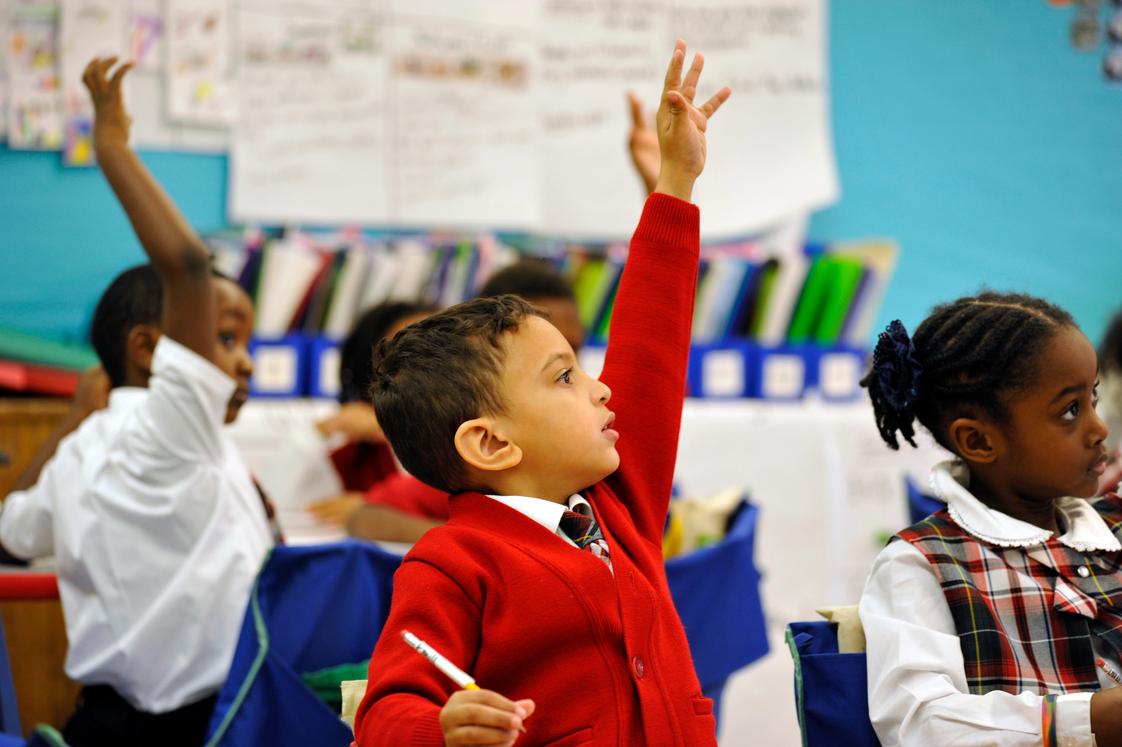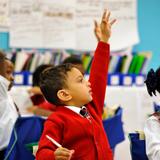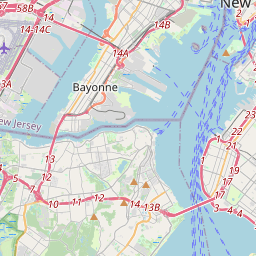Serving 199 students in grades Kindergarten-5, Brooklyn Charter School ranks in the bottom 50% of all schools in New York for overall test scores (math proficiency is bottom 50%, and reading proficiency is bottom 50%).
The percentage of students achieving proficiency in math is 20-24% (which is lower than the New York state average of 46%). The percentage of students achieving proficiency in reading/language arts is 25-29% (which is lower than the New York state average of 49%).
The student:teacher ratio of 28:1 is higher than the New York state level of 11:1.
Minority enrollment is 98% of the student body (majority Black), which is higher than the New York state average of 60% (majority Hispanic and Black).
Quick Stats (2025)
- School Type: Charter School
- Grades: Kindergarten-5
- Enrollment: 199 students
- Student:Teacher Ratio: 28:1
- Minority Enrollment: 98%
- Overall Testing Rank: Bottom 50% in NY
- Math Proficiency: 20-24% (Btm 50%)
- Reading Proficiency: 25-29% (Btm 50%)
- Science Proficiency: 60-79% (Btm 50%)
- Source: National Center for Education Statistics (NCES), NY Dept. of Education
Top Rankings
Brooklyn Charter School ranks among the top 20% of public schools in New York for:
Category
Attribute
Percent Eligible For Free Lunch
Community Size
School Overview
Brooklyn Charter School's student population of 199 students has stayed relatively flat over five school years.
The teacher population of 7 teachers has declined by 41% over five school years.
School Type
Grades Offered
Grades Kindergarten-5
(offers virtual instruction)
(offers virtual instruction)
Total Students
199 students
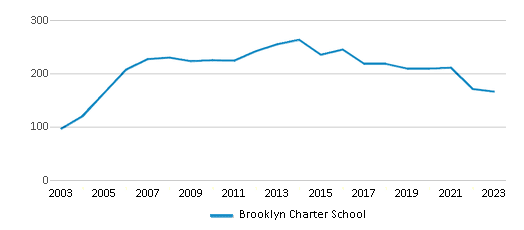
Gender %
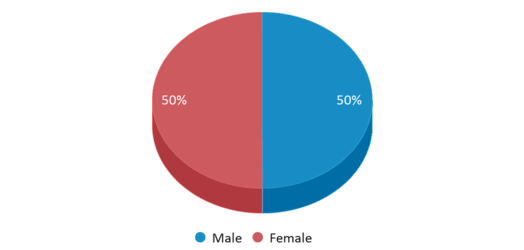
Total Classroom Teachers
7 teachers
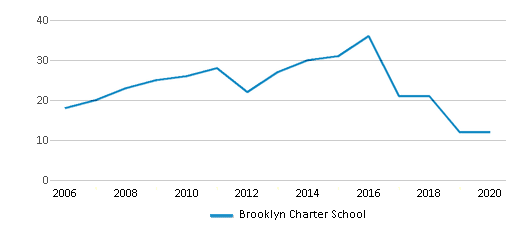
Students by Grade
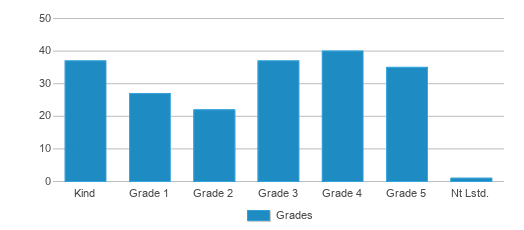
School Rankings
Brooklyn Charter School ranks within the bottom 50% of all 4,377 schools in New York (based off of combined math and reading proficiency testing data).
The diversity score of Brooklyn Charter School is 0.43, which is less than the diversity score at state average of 0.72. The school's diversity has stayed relatively flat over five school years.
Overall Testing Rank
#3710 out of 4377 schools
(Bottom 50%)
(Bottom 50%)
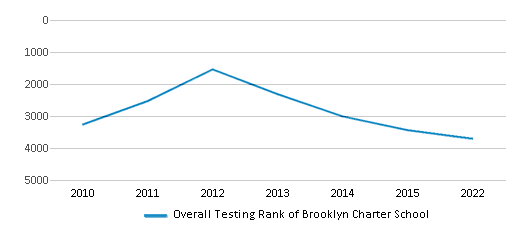
Math Test Scores (% Proficient)
20-24%
46%
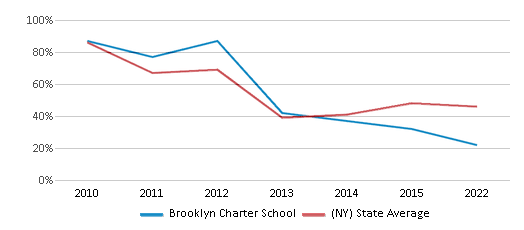
Reading/Language Arts Test Scores (% Proficient)
25-29%
49%
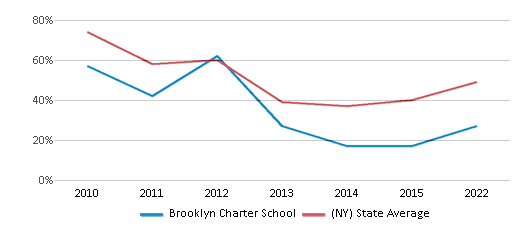
Science Test Scores (% Proficient)
60-79%
78%
Student : Teacher Ratio
28:1
11:1
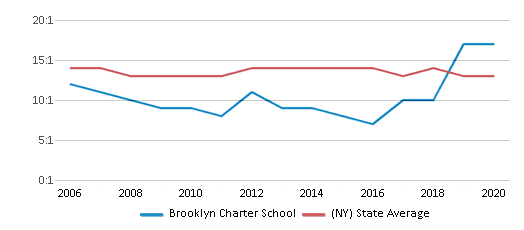
American Indian
1%
1%
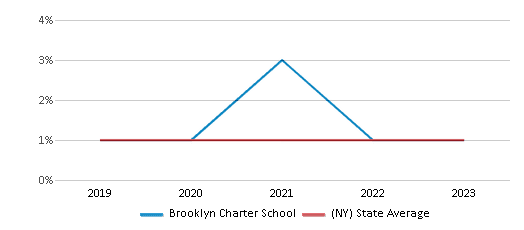
Asian
1%
10%
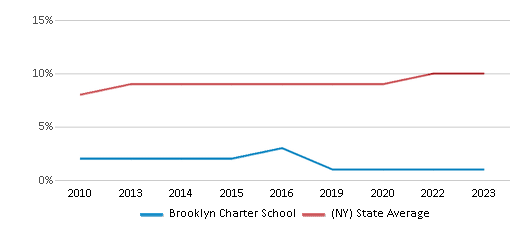
Hispanic
24%
30%
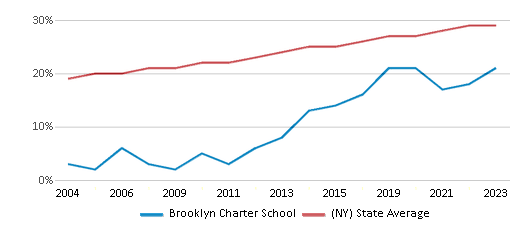
Black
72%
16%
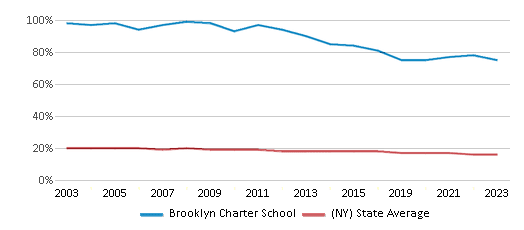
White
2%
40%
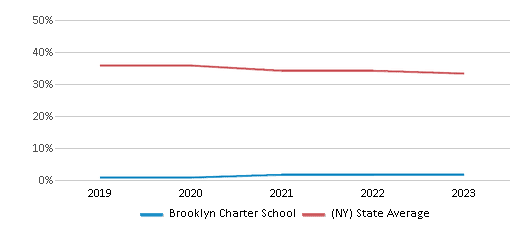
Hawaiian
n/a
n/a
Two or more races
n/a
3%
All Ethnic Groups
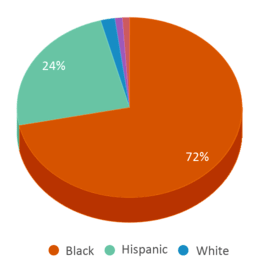
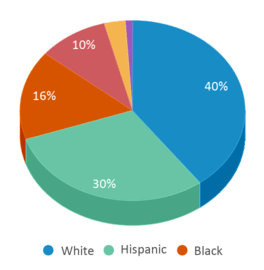
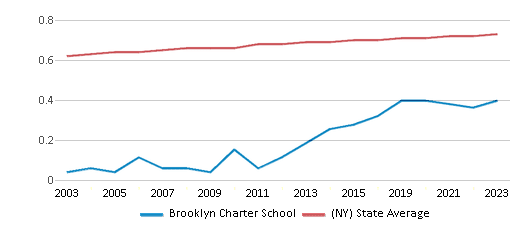
Participates in the National School Lunch Program (NSLP)
Yes
Eligible for Free Lunch
85%
54%
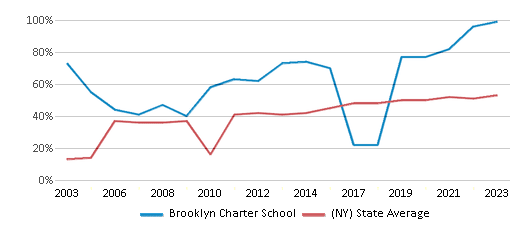
Eligible for Reduced Lunch
1%
3%
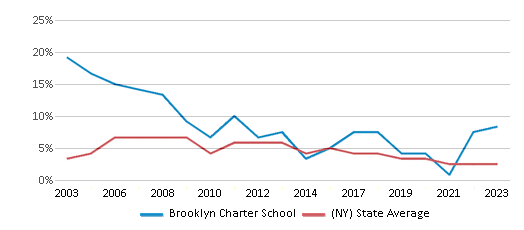
School Statewide Testing
School District Name
Source: National Center for Education Statistics (NCES), NY Dept. of Education
School Notes
- The Brooklyn Charter School`s educational program is designed to meet each learner at their point of entry. Our program is research-based, inclusive of all learning styles and abilities, and is focused on the development, growth and success of the individual learner. All learners are expected to meet and exceed the grade level benchmarks of the Common Core Learning Standards. To do this BCS implements a rigorous curriculum, uses all assessment data to foster effective teaching and learning, incorporates the model of two teachers in the classroom, K-5, and maintains small sized classrooms that foster greater individual attention. The program has been created to raise achievement levels by preparing students with both basic and enriched skills in Reading, Writing, Mathematics, Science and Social Studies. In addition, students are expected to experience and develop a cultural vocabulary in Music and Dance. Students are also taught citizenry and resilience through Harambee (community gathering) and school-wide assemblies. Here, students and faculty work together to create a positive, respectful and nurturing community.
Profile last updated: 02/09/2025
Frequently Asked Questions
What is Brooklyn Charter School's ranking?
Brooklyn Charter School is ranked #3710 out of 4,377 schools, which ranks it among the bottom 50% of public schools in New York.
What percent of students have achieved state testing proficiency in math and reading?
20-24% of students have achieved math proficiency (compared to the 46% NY state average), while 25-29% of students have achieved reading proficiency (compared to the 49% NY state average).
How many students attend Brooklyn Charter School?
199 students attend Brooklyn Charter School.
What is the racial composition of the student body?
72% of Brooklyn Charter School students are Black, 24% of students are Hispanic, 2% of students are White, 1% of students are American Indian, and 1% of students are Asian.
What is the student:teacher ratio of Brooklyn Charter School?
Brooklyn Charter School has a student ration of 28:1, which is higher than the New York state average of 11:1.
What grades does Brooklyn Charter School offer ?
Brooklyn Charter School offers enrollment in grades Kindergarten-5 (offers virtual instruction).
What school district is Brooklyn Charter School part of?
Brooklyn Charter School is part of Brooklyn Charter School School District.
In what neighborhood is Brooklyn Charter School located?
Brooklyn Charter School is located in the Bedford Stuyvesant neighborhood of Brooklyn, NY. There are 46 other public schools located in Bedford Stuyvesant.
School Reviews
Review Brooklyn Charter School. Reviews should be a few sentences in length. Please include any comments on:
- Quality of academic programs, teachers, and facilities
- Availability of music, art, sports and other extracurricular activities
Recent Articles

What Is A Charter School?
Explore the world of charter schools in this comprehensive guide. Learn about their history, how they operate, and the pros and cons of this educational innovation. Discover key facts about charter schools, including admission policies, demographics, and funding, as well as what to look for when considering a charter school for your child.

10 Reasons Why High School Sports Benefit Students
Discover the 10 compelling reasons why high school sports are beneficial for students. This comprehensive article explores how athletics enhance academic performance, foster personal growth, and develop crucial life skills. From improved fitness and time management to leadership development and community representation, learn why participating in high school sports can be a game-changer for students' overall success and well-being.

February 05, 2025
Understanding the U.S. Department of Education: Structure, Impact, and EvolutionWe explore how the Department of Education shapes American education, from its cabinet-level leadership to its impact on millions of students, written for general audiences seeking clarity on this vital institution.


